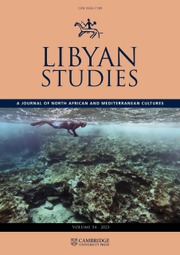No CrossRef data available.
Article contents
The musical tradition of maʾlūf in Libya: rethinking memories from the field
Published online by Cambridge University Press: 08 September 2015
Abstract
The importance of memory in music is both central and multifarious; therefore, it deserves to be preserved and closely scrutinised on a level of importance equal to that of the sound itself and all the other data that go with it. Such preservation should take into consideration both memories coming from ‘inside’ the musical tradition under investigation, mainly as expressed by informants, and those from the ‘outside’, such as those assimilated by the ethnographer in the course of onsite fieldwork. Whilst the former may contribute towards the construction and eventual documentation of the tradition's history, the latter may shed light on the terrain between the self and otherness, as well as the researcher's changing consciousness through which so much evaluation takes place both in the field and at a distance in terms of place and time. This article explores the values ingrained in both categories of memory and the benefits attained in their documentation and preservation, using as its case study the Libyan maʾlūf musical tradition. The article will show how diverse memories have illuminated continuities between the past and present, kindled nostalgia which was eventually transformed into history, provided additional information when immediate information from the sound source was insufficient, and generated reflections and rethinking about the tradition in question in the context of a new social order.
إن أهمية الذاكرة في الموسيقى مركزية ومتنوّعة على حدٍ سواء، وعليه، تستحق أن يتم حفظها وفحصها عن كثب على درجة من الأهمية مساوية إلى ذات الحد للصوت ذاته وكافة المُعطيات الأخرى التي تأتي معه . مثل ذلك الحفظ يجب أن يأخذ بعين الإعتبار وبشكل اساسي الذكريات الآتية من "داخل" التقليد الموسيقي الذي يتم دراسته كما عبّر عنها المخبرون ، وتلك الآتية من "الخارج " مثل تلك التي يتم تجميعها من قِبل الأثنوغرافي خلال العمل الميداني في الموقع . ففي حين قد يساهم السابق تجاه بناء وبالنتيجة توثيق تاريخ التقليد، قد يقوم اللاحق بتسليط الضوء على المنطقة ما بين الذات والغيرية، بالإضافة إلى وعي الباحث المُتغيّر والذي يجري من خلاله تقييم كثير في الميدان وعلى بعد فيما يختص بالمكان والزمان وذلك على حدٍ سواء. تبحث هذه المقالة في القييم المغروسة في كل من فئتي الذاكرة وفي الفائدة المُحققة من توثيقها وحفظها، باستخدام التقليد الموسيقى الليبي (مألوف) كدراسة نموذج . ستُظهر هذه المقالة كيف أن الذكريات المتنوعة أنارت الإستمرارية ما بين الماضي والحاضر وأوقدت الحنين والذي في النهاية تحوّل إلى تاريخ و قدّمت معلومات إضافية في الوقت الذي كانت فيه المعلومة الفورية من المصدر الصوتي غير كافية، مما ادى الى تولد إنعكاسات وإعادة تفكير بشأن التقليد الذي يتم دراسته في سياق نظام اجتماعي جديد.
- Type
- Articles
- Information
- Copyright
- Copyright © The Society for Libyan Studies 2015




